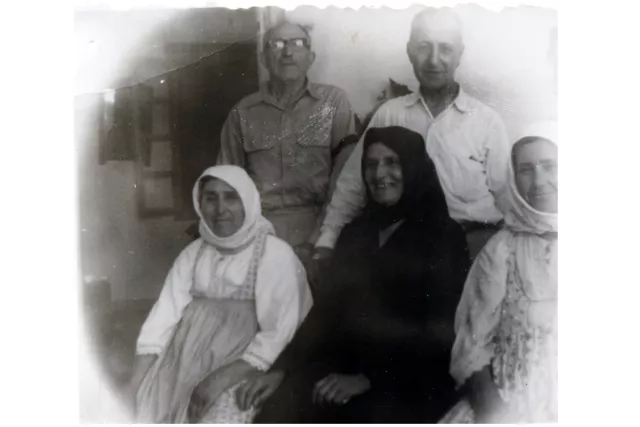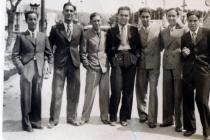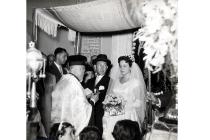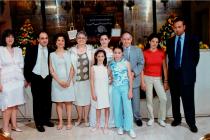These are the people that helped us hide at Glossa, on Skopelos island, during the war. This photo was taken in Glossa in 1954.
In the first row second from left is Magdalini Mitzlioti and third is Magdalini Korfiati.
In the second row at the left is Giorgos Mitzeliotis and at the right is Stefanos Korfiatis.
After hiding in Athens, we went to the Island of Skopelos where we stayed until the end of the war. There were no Germans yet on Skopelos. My brother Jacque had already arrived at Skopelos and was expecting us. People there were very good to us. They had a welcoming hospitality custom: to wash our feet. It was Mrs. Magdalini Mitzelioti, wife of the president of the Community of Glossa in Skopelos, who welcomed us according to the traditional way of Skopelos, by washing our feet. We were staying in village houses. Everybody knew that we were Jews. Nobody was talking about it. They loved us very much. All this until Germans reached Skopelos.
The first ID card I had was issued on 18th May 1943 and said my name was Mavropoulos Georgios, son of Christos and Eirini. But if the Germans had found us in Skopelos with this identity card they would have started questioning what we were doing there. Also the type of the IDs had changed and it was now both in Greek and German language. So I had a second ID issued, stating that I was a Glossa citizen. Mr. Mitzeliotis, the president of the Community of Glossa himself signed the new identity cards. He was the one that saved us. I also remember that Magdalini and Stefanos Korfiatis helped us.
When the Germans reached Skopelos we left the village and went up to the mountain. We were staying in a very small mountain cottage. We didn't keep Jewish traditions while in hiding. We stayed there approximately six months, until the island was liberated. We stayed in the cottage all day long. Just at night we went out to get water, food that our friends from the villages had brought us, and to learn the news. Someone had a hidden radio and he could listen to Radio London. He told us that the United States were now involved in the war.
I do remember another incident that happened while we were hiding. One day we saw Solon Molho, who was hiding in the village, coming towards us. We knew Solon Molho from Thessaloniki. His sister Victoria was married to my brother Juda Leon. Solon Molho that day had taken the pathway leading to our cottage and we could see him, as he was climbing the mountain, approaching us. When he arrived he just said: 'The Americans are coming?' and then fainted. He was exhausted from fatigue and excitement. We were very happy because we knew that sooner or later the Germans would leave.
Giorgos and Magdalini Mitzelioti with Stefanos and Magdalini Korfiati
The Centropa Collection at USHMM
The Centropa archive has been acquired by the United States Holocaust Memorial Museum in Washington, DC.
USHMM will soon offer a Special Collections page for Centropa.
Academics please note: USHMM can provide you with original language word-for-word transcripts and high resolution photographs. All publications should be credited: "From the Centropa Collection at the United States Memorial Museum in Washington, DC". Please contact collection [at] centropa.org.
























